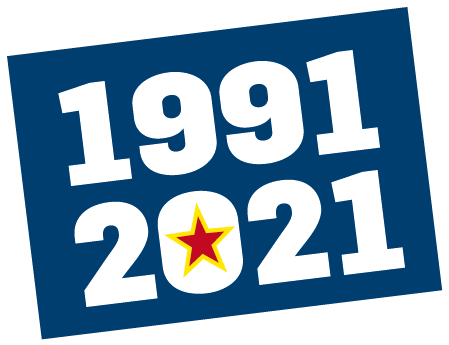
30.06.2021.
Remembering Yugoslavia’s Wars: Reflections on the RECOM Network, a discussion
Coalition for RECOM, Denisa Kostovicova, Jacqueline Nießer, Jasna Dragović Soso, Jelena Subotić, RECOMOn the occasion of the 30th anniversary of the breakup of Yugoslavia, The Leibniz Institute for Eastern and Southeastern European Studies and the Society for Southeast Europe, Regensburg, organized a series of events, including a panel discussion on the importance and impact of the RECOM Initiative, now RECOM Reconciliation Network.
Jasna Dragović-Soso, Professor of International Politics and History at Goldsmiths University in London, Jelena Subotić, Professor of Political Science at Georgia State University in Atlanta, and Denisa Kostovicova, an associate professor at the European Institute of Global Politics within the London School of Economics and Political Science, took part in the discussion aimed at questioning the reasons for the lack of institutional support, the legacy and the scope of the RECOM Reconciliation Network. The discussion was moderated by Jacqueline Nießer from the Leibniz Institute for Eastern and Southeastern European Studies, who is also the author of a book on the Initiative for RECOM in German.
In the introductory part of the discussion, Nießer recalled the initial idea of the regional network, which established a request for an interstate truth commission – to reconcile data on war victims, so that individual numbers of victims would not be used for interethnic disputes. According to Jasna Dragović-Soso, the regional and, above all, supranational character of the Initiative for RECOM was an obstacle to the establishment of an official commission. After the wars of the 1990s, political actors in each of the emerging states focused on identity issues, such as “nation-building” and national reconciliation, rather than confronting the past, which would include acknowledging war crimes committed on one’s own side and justice for all victims. Therefore, the regional narrative that puts victims at the center, regardless of their nationality, as advocated by the Initiative for RECOM, could not fit into the official ethnocentric narratives, which imply the victimization of their own people.
Jelena Subotic and Denisa Kostovicova agreed on the lack of political support and determined and democratically oriented politicians, who would take responsibility for the consistent implementation of transitional justice mechanisms, as one of the key obstacles to changing the dominant, nationalist narrative of the wars of the 1990s, which has now been reproduced for decades through official memory politics, but also educational systems and the media. Kostovicova marked that, as the consequence of that narrative, we are witnessing extremely value-polarized attitudes of the young generations, among whom nationalism is very common. As a difficulty in implementing the mechanisms of transitional justice, Subotic pointed out the lack of understanding with both political actors and the public when it comes to these processes, reduced to large trials, where individuals are tried for crimes, while there is no will to look at social responsibility for past events. The media, in line with the growing conservatism in the regional and global political context, in recent years have become increasingly hostile environment for discussions on dealing with the past.
Given all the obstacles to the institutional implementation of transitional justice and the obvious lack of political support, the speakers agreed that, even after giving up the establishment of official commission, RECOM is a necessary alternative to official ethnocentric narratives. The phase of hope that states and societies will take deep measures of transitional justice is over, and now we are entering a new phase, where there will be individual projects and memories, and memorialization, but not at the wider state level, as Subotic pointed out.
The main achievements of the RECOM Reconciliation Network are reflected in perseverance in research, documentation and regional cooperation. Databases that contain data on each individual victim provide a unique, individualized approach to victims as persons with a name and life story, as opposed to a dominant approach that speaks of them only as numbers.
The idea of regional approach and reconciliation as a goal, as Kostovicova points out, proves to be meaningful on the examples of those who change their political positions after direct meetings with representatives of the “other side”. However, she pointed out that the amount of data RECOM reconciliation network is providing represents a kind of challenge for researchers.
Answering a question about the criticism of the RECOM / RECOM Reconciliation Network Initiative as a yugo-nostalgic project, the speakers pointed out the dangers of historical revisionism, which, ignoring a part of the history of post-Yugoslav states, makes it impossible to look at the past in a critical light, and learn valuable lessons for the future. Rather than a product of yugo-nostalgia, Dragović-Soso described RECOM as a project of regional solidarity.
The coordinator of the RECOM Reconciliation Network, Nataša Kandić, also joined the discussion. She pointed out that RECOM is a unique process because it is not motivated by external factors, such as fulfilling obligations to donors. It was created by the efforts of civil society, out of the need of all the former Yugoslavia countries to deal with the mutual past. The challenge for member organizations of the RECOM Reconciliation Network is the fact that Croatia and Slovenia, since becoming members of the European Union, are no longer seen as part of the same region as the Western Balkans, so organizations from these countries no longer receive funding for joint activities. This could be misinterpreted as evidence that, unlike Bosnia and Herzegovina, Serbia, Kosovo and Northern Macedonia, the two countries have made significant progress in transitional justice. Kandić, however, points out that the only way for the progress and democratization of post-Yugoslav societies is the proportional involvement of each country in resolving issues from the mutual past.














